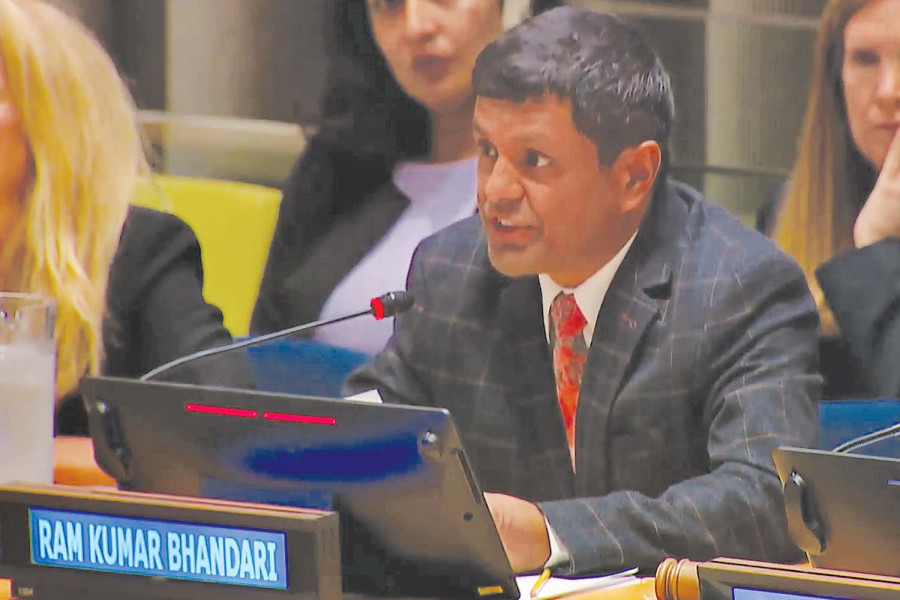National
Nepal insurgency victim takes case to UN Security Council
Ram Kumar Bhandari’s father was forcibly disappeared by state security forces during the conflict in 2001.
Binod Ghimire
With the country’s transitional justice process paralysed, a Nepali conflict victim has taken to the United Nations forum to remind the Nepal government of its responsibilities towards the victims.
Speaking before the UN Security Council in New York on Wednesday, Ram Kumar Bhandari, whose father was forcibly disappeared by the state security forces in 2001, said that the state has the responsibility to search for answers and provide closure to the victims, but it has not done enough.
Nepal endured a violent Maoist insurgency from 1996, which ended after ten years with a comprehensive peace accord in 2006.
Bhandari addressed the council as a representative of the Global Alliance of the Missing, advocating for families of missing and disappeared people across the world.
“The world has not done enough to acknowledge the suffering of the families or to address their needs,” he said. “Families in Nepal are still waiting for answers 18 years after the end of the conflict.” This is the second time that an insurgency victim was allowed to speak before the UN Security Council, considered one of the most influential UN bodies.
He said the families would like to remind states that they seek their continued support in mobilising the relevant authorities to find the “political will” and the needed resources so that families can find truth, answers, and justice.
There is no sustainable peace without individual peace, he asserted.
“We, families of missing people, would like to encourage states to adopt missing persons legislation and appropriate legal frameworks in all countries where missing persons are present,” he further said.
Talking to the Post over the phone from New York, he said that addressing the UN Security Council was a great opportunity to remind the leadership from different countries, including Nepal, about the situation of conflict victims and these states’ obligation towards them.
“Imagine surviving the horrors of a war, only for your father, mother, siblings or children to go missing. What happens to those who remain when a family member is lost, not to death or relocation but to an enforced disappearance or having gone missing? How do the people left behind cope with that tragedy and move on,” he said.
Bhandari’s father, Tej Bahadur, a former teacher, was arrested from Besisahar, headquarters of Lamjung district, on December 31, 2001, during the state of emergency. He was detained by a joint team of security forces commanded by then Deputy Superintendent of Police Pitambar Adhikari, according to the complaint filed at the disappearance commission. Tej Bahadur was blindfolded, handcuffed, and tortured in the street before being taken into custody, and was never seen again.
Like Bhandari, thousands of families of the victims of enforced disappearances and other human rights violations have continuously been fighting for justice for around two decades, but successive governments and political parties have paid little attention to justice delivery.
Records at the Commission of Investigation on Enforced Disappeared Persons show as many as 3,223 complaints of enforced disappearances implicating either security forces or the Maoists have been lodged at the commission. The commission has identified 2,494 cases falling under its jurisdiction for investigation. Similarly, 63,718 complaints have been registered with the Truth and Reconciliation Commission.
Human rights defenders say a conflict victim demanding justice from the UN Security Council is a significant step. “Bhandari’s address will definitely build pressure to move the transitional justice process forward. His statement has been officially recorded,” Mohna Ansari, a former member of the National Human Rights Commission, told the Post. “It might not have immediate results, but Nepal might face questions at the UN forums like the Universal Periodic Review.”
Nepal’s transitional justice process has been paralysed since July 2022, when the government decided to extend the terms of two commissions without retaining their chairpersons and members. Despite the government’s claim that the amendment bill to the Transitional Justice Act would be endorsed by October 2022, which would also open the door for recruiting new office bearers, there has been no progress in amending the Act.
The major political parties, despite making several attempts, have been unable to find a meeting point on the bill though there has been some progress.
After year-long discussions, the Law, Justice and Human Rights Committee of the House of Representatives has narrowed down the differences in the bill. However, the House panel had been struggling to decide whether to categorise arbitrary killings or all killings except those that occurred in clashes as serious violations of human rights. It had also been unable to decide what happens in case the victims of human rights violations refuse to reconcile and demand punishment for the perpetrators.
The Pushpa Kamal Dahal administration, through the national budget presented on May 28, has decided to set up a one-billion-rupee peace fund to provide relief and compensation to the victims. The government also has also announced to expedite the transitional justice process in the upcoming fiscal year.
However, the bill has not been discussed since the formation of the UML-Maoist coalition on March 4. It is not known when the parliamentary committee will start discussing the amendment bill. Om Prakash Mishra, former Supreme Court chief justice, leads the committee formed to recommend the names of the office bearers of two commissions, but without the Act being amended, it has not commenced its work.
Also addressing the UN Security Council, Lok Bahadur Thapa, Nepal’s permanent resident to the UN, said the country is committed to delivering justice to the victims by adopting its own homegrown and nationally-led process. “We have two transitional commissions to investigate the complaints. Similarly, the parliament is working on the amendment to the transitional justice law as directed by the Supreme Court,” he said.




 8.79°C Kathmandu
8.79°C Kathmandu















